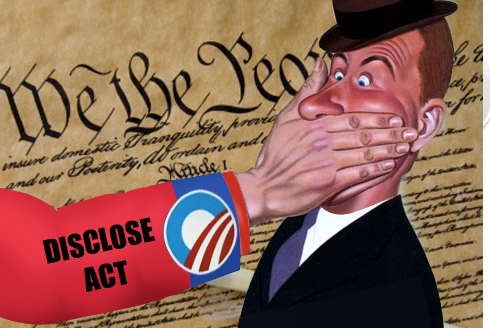
Writing at National Review Online today, former FEC Chairman Bradley A. Smith explains why the DISCLOSE Act is such a bad piece of legislation. “It’s an election year, and incumbents are nervous. And so, in a classic sign of political weakness, Senate Democrats have scheduled a vote on legislation that would manipulate campaign-finance laws to silence their opponents. Their weapon is the “DISCLOSE Act,” a gimmicky acronym . . . . Democrats in Congress have been trying to pass various versions of the bill since the winter of 2010 . . . . [W]hy should anyone be opposed to it? First, because DISCLOSE attempts to scare and regulate people into remaining silent. Second, because this is clearly being done for partisan purposes. And third, because we already have more campaign-finance disclosure than ever before, and more disclosure is simply unnecessary.”
Smith writes, “As Senator Charles Schumer (D., N.Y.) said when introducing the original bill in 2010, ‘the deterrent effect [of DISCLOSE] should not be underestimated.’ The bill’s real aim is to force trade associations and nonprofits to publicly name their donors. Such lists might be used by competing groups to poach members, or, more ominously, by government officials to threaten or retaliate against political opponents, or by interest groups to gin up boycotts and threats against the individual and corporate members of the groups. As Senate Minority Leader Mitch McConnell (R., Ky.) noted in a recent speech at the American Enterprise Institute, the Obama campaign has already been encouraging supporters to harass and publicly vilify and embarrass political opponents. Liberal groups have also been threatening corporations with lawsuits, disruption of shareholder meetings, and boycotts if they engage in political speech that departs from the liberal agenda. Conservative organizations’ members and donors have lost their jobs after liberal groups boycotted their employers — employers that had nothing to do with conservative causes themselves. Beyond intimidation, there is the sheer force of regulation. Perhaps the most infamous provision of the McCain-Feingold law was a restriction on the ability of groups, within 60 days of a general election, even to mention the name of a congressman running for reelection. DISCLOSE resurrects this idea with a vengeance.”
Meanwhile, the Washington Free Beacon reports, “Democratic Senators introduced the new version of the bill on the same day the Wall Street Journal reported unions and labor groups spent $4.4 billion in political activity between 2005 and 2011. [A senior Republican aide] said the heart of the Democrats’ decision was protecting unions from disclosure while forcing their political adversaries, such as the Chamber of Commerce and American Crossroads, to reveal their donors. American Crossroads announced last week it was purchasing $40 million worth of advertisements in eight battleground states. ‘What’s interesting is the comparison,’ the aide said. ‘A $40 million ad buy has them scared to dickens, but unions on track for $800 million in spending this year get a pass.’ The U.S. Chamber of Commerce, along with 60 other business groups such as the National Restaurant Association and the National Retailers Association, sent a letter to Capitol Hill Friday that said the bill is ‘designed to chill the political speech of corporations, business interests, and others, while giving labor unions special protections.’”
Related:
Video: Sen. McCaskill Floor Speech – DISCLOSE Act

0 responses so far ↓
There are no comments yet...Kick things off by filling out the form below.
Leave a Comment